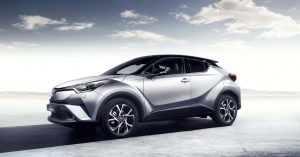 Crossovers have become the rage on American roadways over the past decade, resulting in an influx of new offerings from several automakers. The latest entry from Toyota is the C-HR, a fun-to-drive crossover that’s sure to resonate with younger drivers. However, no buyer can turn their back on the 2018 Toyota Camry, which has been one of the most popular and reliable cars on the road for over 35 years. While both have their perks, choosing between the C-HR and the Camry may just boil down to your own personal tastes. Here’s a look at what each has to offer.
Crossovers have become the rage on American roadways over the past decade, resulting in an influx of new offerings from several automakers. The latest entry from Toyota is the C-HR, a fun-to-drive crossover that’s sure to resonate with younger drivers. However, no buyer can turn their back on the 2018 Toyota Camry, which has been one of the most popular and reliable cars on the road for over 35 years. While both have their perks, choosing between the C-HR and the Camry may just boil down to your own personal tastes. Here’s a look at what each has to offer.
Size
One of the definitive factors between the C-HR and the Camry is size. Whether you’re using these vehicles as a family hauler or for cargo room can make an impact on which one you buy. Both can seat up to five passengers, but the Camry actually takes the edge in comfort with more legroom, hip room, and shoulder room than the C-HR.
However, the 2018 Toyota C-HR has an edge on cargo space. Behind the rear seat, it can accommodate up to 19.1 cubic feet, whereas the Camry only has a trunk of 13 cubic feet. For more room, fold down the C-HR’s rear seats to unveil a whopping 36.4 cubic feet of space. If cargo space is high on your priority list, the C-HR’s room and cargo configurations make it a winner.
Engine Power
When you want to burst off the line and feed your insatiable need for speed, the 2018 Toyota Camry is your best bet. With new Dynamic Force technology, the sedan gets improved horsepower and torque on both its four-cylinder and V-6 engines. The standard 2.5-liter inline-four offers 203 horsepower and 184 pound-feet of torque, while the available 3.5-liter V-6 churns out an impressive 301 horsepower and 267 pound-feet of torque. With the larger V-6, the Camry touts a 0 to 60 of just 5.8 seconds and a top speed of 136 mph.
The Toyota C-HR doesn’t offer as much pace, but it’s no slouch. Beneath the hood is a 2.0-liter four-cylinder that’s good for 144 horsepower and 139 pound-feet of torque. This equates to a top speed of 115 mph and a 0-60 of 11 seconds. When you want that extra pep, the C-HR is just a step behind the 2018 Camry.
Fuel Economy
Fuel economy is a top priority for many drivers, and with either the Camry or the C-HR, you won’t have to go to the pump as often as some of the other options on the market. Regardless of trim, the C-HR boasts 31 mpg on the highway, 27 mpg in the city, and 29 mpg combined.
The four-cylinder Camry offers up to 41 mpg on the highway and 29 mpg in the city when equipped with an eight-speed automatic transmission. The V-6 variant provides 32 mpg on the highway and 22 mpg in the city, although the uptick in power is worth it for some drivers.
Both the C-HR and the Camry offer a nice selection of options and amenities that other vehicles can’t replicate, yet choosing between the two isn’t an easy task. The best part is that no matter which one you choose, you’ll have a vehicle that does everything you want and more.
“Toyota C-HR Hybrid (5)” via Flickr by hero4262321. Used with permission via Public Domain Mark 1.0 / cropped from original



